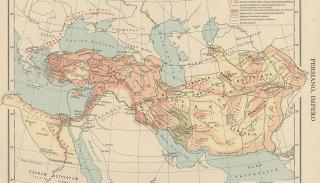
Breadcrumbs navigation
Imperial power, anti-imperial resistance, and the shaping of international hierarchies: Lessons from 1930s Persia
In this short summary video, author Evaleila Pesaran discusses the key points from her Review of International Studies (RIS) article - Imperial power, anti-imperial resistance, and the shaping of international hierarchies: Lessons from 1930s Persia.
The article explores how relations of both domination and resistance have been involved in the constitution of international hierarchies. Focusing on events arising from the Persian government’s 1932 cancellation of the D’Arcy oil concession, it argues that while Western-dominated international hierarchies have proved resilient, some aspects of these hierarchical relationships have been altered by episodes of resistance such as the one under examination in this article.
Want to know more? You can read the full article at DOI: https://doi.org/10.1017/S0260210523000190
This particular article is open access, however BISA members receive access to all articles in RIS (and our other journal European Journal of International Security) as a benefit of membership. To gain access log in to your BISA account and scroll down to the 'Membership benefits' section. If you're not yet a member join today.
Abstract
This article explores how relations of both domination and resistance have been involved in the constitution of international hierarchies. Focusing on events arising from the Persian government’s 1932 cancellation of the D’Arcy oil concession, it argues that while Western-dominated international hierarchies have proved resilient, some aspects of these hierarchical relationships have been altered by episodes of resistance such as the one under examination in this article. The case study has been chosen because of its ability to highlight the interwar years as an important period of transition to a new world order, as well as the significance of Persia as one of the few non-Western countries that remained uncolonised at that time. The article revisits detailed historical documents from the BP Archives and the National Archives to show how the events of the 1930s oil dispute contributed to the emergence of shifts in the material, legal, and social hierarchies of the interwar period, while nevertheless reinforcing the existence of hierarchies overall. It shows how multilateral diplomacy replaced overt military intimidation, the framework of international law broadened, and peripheral countries found strength in numbers. Finally, the article considers the longer-term resilience of the hierarchical international system.
Image by Touring Club Italiano licensed under the Creative Commons Attribution-Share Alike 4.0 International license.